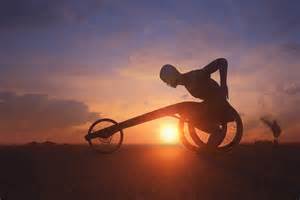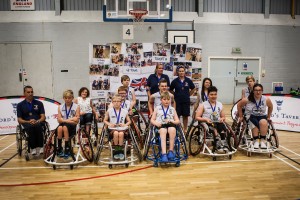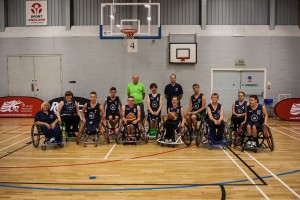Today, the world of disability sport is a darker place. Josie Cichockyj died on 3rd December 2014. For her family, and her many, many friends, the world will change forever.
There are numerous news reports today, on various social media sites, and internet magazines, which list Josie’s sporting achievements, from Paralympic Games, to London Marathon, and everything in between, so I won’t be repeating all those here. All the words already written are a worthy tribute.
I met Josie, like many other parents, as a basketball coach, mentoring our special kids. Her gift, to me, particularly, was the enthusiasm she imparted, and her skill of talking to our kids as mini-adults – having expectations for them, where many other professionals we encounter, have few. Her example, from the aforementioned achievements, to her recent aeroplane piloting feats inspire everyone to live life without limits, and I know her enthusiasm for sport gave many disabled people the gift of hope.
I’m republishing here, Josie’s guest blog. She has been a great friend to many wheelchair sports clubs, as coach, mentor, opponent and participant. Hers is a smile we will all miss, and the clubs she was personally involved with will feel the worst pain. From all the players and junior basket-ballers, we offer up a rousing ovation of applause for Josie Cichokyj, and I hope, one day, her family and friends will take comfort from our words and memories.

Days that changed our lives – a guest blog, by Josie Cichockyj, first published here on 27/9/13
We can all name days that changed our life forever but mine just seems to keep on changing and success always appears to be around the corner.
When I refer to success, I am a three times Paralympian, 5,000m World Record Holder, British Record holder in every distance from 100m to 5,000m, London and Great North Run Winner, European Wheelchair Basketball bronze medallist, GB Wheelchair Basketball Captain, Mavericks Club Coach and business owner
I have had so many of those days that changed my life that I just have to pinch myself sometimes when I look back at all the experiences in my life. I think this inner ability to almost keep re-inventing yourself is what makes it all so fulfilling.
I look back and reflect and think why me? I don’t think there is any specific reason for my achievements. Everything I did just came natural and seemed easy. More importantly, I was enjoying it and having endless fun! I remember at the 1984, Paralympics, Prince Charles ended his Opening Ceremony speech by saying but most of all have fun. Well I have certainly endeavoured to make that a lifestyle.
I don’t come from financial wealth or success. In fact, I am one of 10 children, 6 sisters and 3 brothers. No one in my family was of a sporting pedigree. Nor did they particularly have aspirations to travel the world in pursuit of happiness. We were not materialistic. We had very little but we had each other and enjoyed our time together.
I was always a bit of dreamer and actually believed my dreams would become reality, no matter how many people laughed and ridiculed them. I seemed to see and find a way to do it by accepting it as a great adventure, an exploration that excited me. Sure I struggled sometimes and hit obstacles but these were mere challenges to overcome. Scary but I never doubted that I would not find a solution and if not me, there was definitely someone who would help me. I was never ever scared of asking for help, I loved talking to people!
I think decision-making was pretty easy for me. I was either doing something or I wasn’t, simple as. If I was doing it, you could guarantee it was always 100% to the level of irritation to those around me. That commitment to my decisions was probably the reason I succeeded. To say that I was focussed was an under-statement.
I just seemed to have loads of time to do everything I needed to do. No matter what, I could find time and it was like spinning plates. I never put anything off. I just did it now with utmost urgency like my life depended on it. No time for procrastination, I was on a mission. Billie Jean King, the tennis player used to say, stay in the moment! I was definitely present. I knew what my goal was but I knew the steps and the actions required to achieve them. If I only had time for a couple of hours sleep a day, so be it!
I wasn’t just visualising my goals, I was achieving them and taking action daily, whether it was training, watching videos, books or meetings. I don’t think I doubted my ability. Talk about forgiving yourself for doing it wrong and putting your foot in it. I forgave myself daily because I was only accountable to me. If it was to be it was going to be up to me, no one else.
I had a very positive attitude and didn’t look for excuses but solutions. I had a mentality that demanded hard work to such an extent that if I was relaxing, I was actually annoyed with myself for wasting my day. I think this came from my parents. My mum was Head Girl, at school and my dad was a prisoner of war in Poland, during the Second World who came to England, as a refugee. My mum’s leadership and hard work ethic and dad’s ability to mentally overcome such atrocity gave me strength and gratitude to face life head on.
Sure there were people who wanted me to find problems in everything. They even wanted me to fail. They were always telling me it can’t be done and attempting to create doubt. I had this absolute trust in my ability and those I surrounded myself with in pursuit of excellence. I know as we grow older, trust can change with life experiences and draw backs but I still always keep moving forward and take the knocks and accept that it is part of my learning curve.
I can tell you so many times I have endured an inner terror. However, I have felt scared and excited at the same time. My heart has raced to the point that I thought that I would die! I have always feared public speaking and yet I coached and trained teams in sport and in the work place. If there was one thing that held me back it was this, but when I decided to step outside my comfort zone and become a public speaker everything changed; all of sudden it was easy! I don’t understand, guess it’s the paradigm shift of ‘yes, I’m the speaker’, not the person in the audience saying I could never get on that stage. I just changed the habit and created a new experience.
I just started applying the traits of my other successes. I accepted that some things will always feel embarrassing. I will always fear doing it wrong. By turning it on its head and accepting that everything we do for the first time is difficult, I could find ways of doing it well. This usually came down to practice, repetition and enduring the same activity over and over again without loss of enthusiasm, determination and passion.
The journey of my life is one of great fulfilment. I always say if I die tomorrow that I loved my life. I have endured hardship, faced difficulties, felt scared, been hurt, cried, felt confusion and the greatest of disappointments through failure but yet, I have managed to overcome them and bounce back. I will feel this way again for sure but starting over every day in the pursuit of loving life, helping others and having gratitude for the opportunities life as afforded me, I know that there will be more success around the corner.
I started this blog wanting to talk about days that changed my life but to have those days you need to understand the emotions, the mindset behind those days. Why I had success I don’t know. How I can help you achieve success, I don’t know. I do know that I have two favourite quotes, ‘enthusiasm is like a ripple on water, it grows’ and ‘A ship is safe in harbour but that’s not what ships are for’. All I know is both enthusiasm and the journey into the unknown have served me so well.
Finally, yes I do take myself a bit too seriously sometimes but the ability to laugh at myself and know that a day without laughter is a day wasted is a blessing and helps me enjoy all that is good in life.
![2598322144_5b03cd8567_m[1]](https://cumbriawheelchairsports.wordpress.com/wp-content/uploads/2014/12/2598322144_5b03cd8567_m1.jpg?w=580)
Rest in Peace, Josie…



![2598322144_5b03cd8567_m[1]](https://cumbriawheelchairsports.wordpress.com/wp-content/uploads/2014/12/2598322144_5b03cd8567_m1.jpg?w=580)



